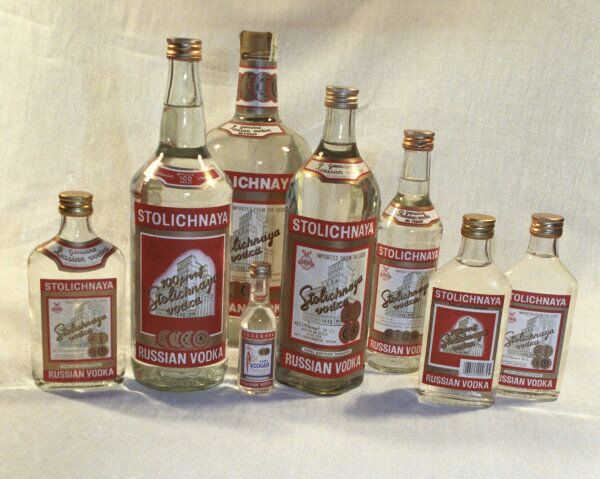This article contains information not suitable for readers younger than 18 years of age, according to Russian legislation.
WASHINGTON, July 26 (By Maria Young for RIA Novosti) – It is perhaps the single best-known Russian brand. But as US gay groups call for a boycott of Russian products including Stolichnaya vodka to protest new Russian laws on homosexuality, the beverage’s owner is racing to convince them that “Stoli,” as it is popularly known, is not Russian at all.
“Technically, to define it as a Russian vodka in the US, it needs to be produced, bottled and distilled in Russia. Yes, it’s distilled in Russia, but it becomes a vodka in Latvia,” when the alcohol from Russia is added to the mixture and then bottled, said Marco Ferrari, chief marketing officer for the Luxembourg-based SPI Group, which owns the Stolichnaya brand.
“Our ingredients are Russian but technically it’s not a Russian vodka,” he added in a phone interview from Luxembourg.
It has become a critically important distinction for the company in recent days, because of a growing boycott of Russian products by Lesbian, Gay, Bisexual and Transgender (LGBT) activists and supporters in the United States, who are protesting recently-passed anti-gay laws and what they say is a dangerous environment for homosexuals in Russia.
“Life has been increasingly difficult for gay and lesbian people in Russia, with discrimination and violence,” said Art Johnston, co-owner of Sidetrack, a large gay bar in Chicago and one of the first in the country to remove Stolichnaya from its shelves.

“Gay pride celebrations have been attacked, clearly with authority approval. And there’s a series of laws promoted by Russian President Vladimir Putin that make it clear war has been declared in Russia on gay and lesbian people,” he said.
At least seven other bars in the nation have also agreed to the boycott on Stolichnaya and other Russian products this week, according to several bars contacted by RIA Novosti.
“Either the lives of gay and lesbian people in Russia mean something or they don’t, and if they mean something we are compelled to help, and so if it means dropping a Russian vodka, then that’s what it means,” Johnston told RIA Novosti in a phone interview, explaining his decision to drop Stolichnaya.
Stolichnaya was the first targeted brand to respond to the boycott on Thursday, posting a multi-colored, strongly-worded statement critical of the Russian government on its Facebook page and company website and releasing an open letter of support to the LGBT community from Val Mendeleev, SPI chief executive officer (CEO).
There is a long history of legal battles between Stolichnaya and the Russian government, battles that came to a head in 2010, he explained.
“We were singled out for political reasons. There was a law enacted specifically to disallow us to be the Russian vodka. We now produce it in the original distillery in Latvia,” Mendeleev told RIA Novosti in an interview.
Yes, the company owner, Yury Shefler, is Russian, and quite prominent, but “He doesn’t live in Russia, he cannot even go to Russia, he was really kicked out,” Mendeleev said.
“I am an ex-Russian as well, and I make a huge distinction between the Russian government and the Russian people. On the one hand, we do have a Russian heritage, I’m quite proud of this. But in no way do I want to be associated with the Russian government. They see us as opponents,” Mendeleev said from Luxembourg.
The confusion is understandable, he said, but the reality is that, “We as a group have always promoted fairness and transparency, and have been strong supporters of the LGBT community from years ago, and suddenly to be associated with what’s happening in Russia now, it’s nuts, because it’s just the opposite of what we do.”
Many in the community said the Stoli response was a good start. But they shrugged off Mendeleev’s protestations that Stolichnaya was not really a Russian vodka at all and said the company needs to do more – in Russia, specifically – if it genuinely supports the rights of gay people.
“They're paying attention, which is good, and they're scared, which is even better,” wrote US author and gay rights activist Dan Savage in a blog.
He added: “While it's nice that SPI is willing to market to homos who are lucky enough to live in Austria, the US, and South Africa, what has SPI done in Russia? But have they sponsored gay pride events in Moscow or St. Petersburg? Has Stoli said anything to the Russian authorities?”
Nina Long, co-president of RUSA LGBT, a gay rights group made up of Russian-Americans in New York and a driving force behind the boycott, agreed.
“Yes, they may bottle the vodka in Latvia, but they own the field that grows the wheat in Russia, and they use the fact that they are Russian as part of their marketing campaign. How else are they going to sell vodka in the US?” she said.
But, she added, the response from Stolichnaya “was an absolutely honorable thing to do. They said they supported their LGBT community worldwide and that should be recognized.”
It isn’t just about vodka, said Johnston, but about rejecting a climate of intolerance. He has an empty space on the shelves of his bar where the Stoli stood until recently.
“Their name is Stolichnaya. It’s an iconic brand and they of all people have a responsibility. I want to hear their plan for actually doing something to affect all this, and if that happens, I will put it back on my shelves with fanfare!” he said.


